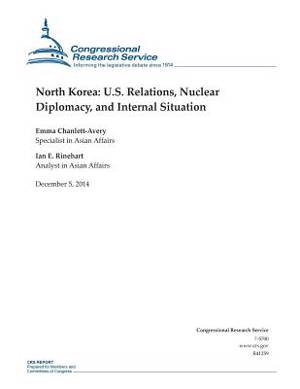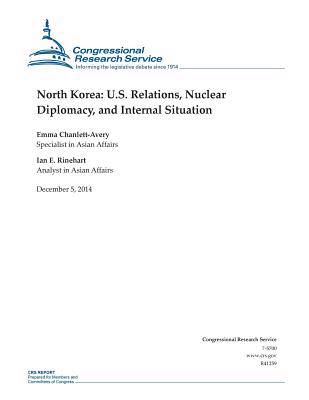
- Retrait gratuit dans votre magasin Club
- 7.000.000 titres dans notre catalogue
- Payer en toute sécurité
- Toujours un magasin près de chez vous
- Retrait gratuit dans votre magasin Club
- 7.000.000 titres dans notre catalogue
- Payer en toute sécurité
- Toujours un magasin près de chez vous
North Korea
U.S. Relations, Nuclear Diplomacy, and Internal Situation
Congressional Research Service
34,95 €
+ 69 points
Description
North Korea has presented one of the most vexing and persistent problems in U.S. foreign policy in the post-Cold War period. The United States has never had formal diplomatic relations with the Democratic People's Republic of Korea (the official name for North Korea), although contact at a lower level has ebbed and flowed over the years. Negotiations over North Korea's nuclear weapons program have occupied the past three U.S. administrations, even as some analysts anticipated a collapse of the isolated authoritarian regime. North Korea has been the recipient of over $1 billion in U.S. aid (though none since 2009) and the target of dozens of U.S. sanctions. This report provides background information on the negotiations over North Korea's nuclear weapons program that began in the early 1990s under the Clinton Administration. As U.S. policy toward Pyongyang evolved through the 2000s, the negotiations moved from a bilateral format to the multilateral Six-Party Talks (made up of China, Japan, Russia, North Korea, South Korea, and the United States). Although the negotiations reached some key agreements that laid out deals for aid and recognition to North Korea in exchange for denuclearization, major problems with implementation persisted. The Six-Party Talks have been suspended throughout the Obama Administration. As diplomacy remains stalled, North Korea continues to develop its nuclear and missile programs in the absence of any agreement it considers binding. Security analysts are concerned about this growing capability, as well as the potential for proliferation to other actors. After Kim Jong-il's death in December 2011, his youngest son, Kim Jong-un, has consolidated authority as supreme leader. Bilateral agreements with the United States in February 2012 involving the provision of aid and freezing some nuclear activities fell apart after Pyongyang launched a long-range ballistic missile in April 2012. Prospects for negotiations dimmed further after another, more successful, launch in December 2012 and a third nuclear test in February 2013. In response to new U.N. sanctions, Pyongyang sharply escalated its rhetoric and took a number of provocative steps. The U.S. reaction included muscular displays of its military commitments to defend South Korea and moves to bolster its missile defense capabilities. Since this flare in tensions, North Korea has expanded its diplomatic outreach with Japan, South Korea, and Russia. The release in late 2014 of three U.S. citizens who had been detained in North Korea also may have removed one obstacle to restarting dialogue with the United States. As ties with China apparently cooled, Pyongyang appeared to be seeking to avoid diplomatic isolation as well as to reduce its almost total economic dependence on China. Simultaneously, international attention to North Korea's human rights violations intensified at the United Nations, drawing Pyongyang's concern and protests. North Korea is already under multiple international sanctions imposed by the United Nations Security Council in response to its repeated missile and nuclear tests.
Spécifications
Parties prenantes
- Auteur(s) :
- Editeur:
Contenu
- Nombre de pages :
- 32
- Langue:
- Anglais
- Collection :
Caractéristiques
- EAN:
- 9781505587234
- Date de parution :
- 05-12-14
- Format:
- Livre broché
- Format numérique:
- Trade paperback (VS)
- Dimensions :
- 216 mm x 280 mm
- Poids :
- 99 g







